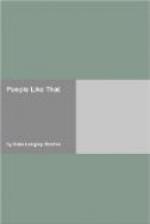CHAPTER XIV
A moment later we were up-stairs. “I don’t know why I am so cold.” My hands, not yet steady, were held out to the leaping flames. “Usually I love a snow-storm, but to-day—”
“They tell me you rarely have such weather as we have had of late. Personally I like it, but to many it means anything but pleasure. Is this the chair you prefer?”
At my nod he pushed a low rocker closer to the fire and placed a foot-stool properly. Drawing up the wing-chair he sat down and looked around the room. As the light fell on him I noticed the olive, almost swarthy, coloring of his skin, his deep-sunk eyes with their changing expressions of gravity and humor, of tolerance and intolerance, and I knew he was the sort of man one could talk to on any subject and not be misunderstood. His hair was slightly gray, and frequently his well-shaped hand would brush back a long lock that fell across his temple. His clothes were not of a clerical cut, and evidently had seen good service; and that he gave little attention to personal details was evidenced by his cravat, which was midway of his collar, and his collar of a loose, ill-fitting kind.
About him was something intensely earnest, intensely eager and alert, and, watching him, I realized he belonged to that little group which through the ages has dared to differ with accepted order; and for his daring he had suffered, as all must suffer who feel as well as think.
“You don’t mind,” the smile on his face was whimsical, “if I take a good draught of this, do you? It’s been long since I’ve seen just this sort of thing.” His eyes were on a picture between two windows. “Out of Denmark one rarely sees anything of Skovgaard’s. That Filipinno Lippi is excellent, also. At the Hermitage in St. Petersburg I tried to get a copy like that”—he nodded at Rembrandt’s picture of himself—“but there was none to be had. Did you get yours there?”
“Four years ago. I also got that photograph of Houdon’s Voltaire there.”
He looked in the direction to which I pointed, and, getting up, went over to first one picture and then another, and studied them closely. A bit of bronze, a statuette or two, an altar-piece, a chalice, a flagon, a paten, a censer, and an ikon held his attention, one after the other, and again he turned to me.
“These are very interesting. Is it as one of the faithful you collect?” A smile which strangely lighted his face swept over it.
“Oh no!” I shook my head. “The faithful would find me a most disturbing person. I ask too many questions.” My hand made movement in the direction of the bookshelves around the four sides of the room, on the tops of which were oddly assorted little remembrances of days of travel. “A study of such things is a study of religious expression at different periods and among different peoples. They’ve always interested me.”




